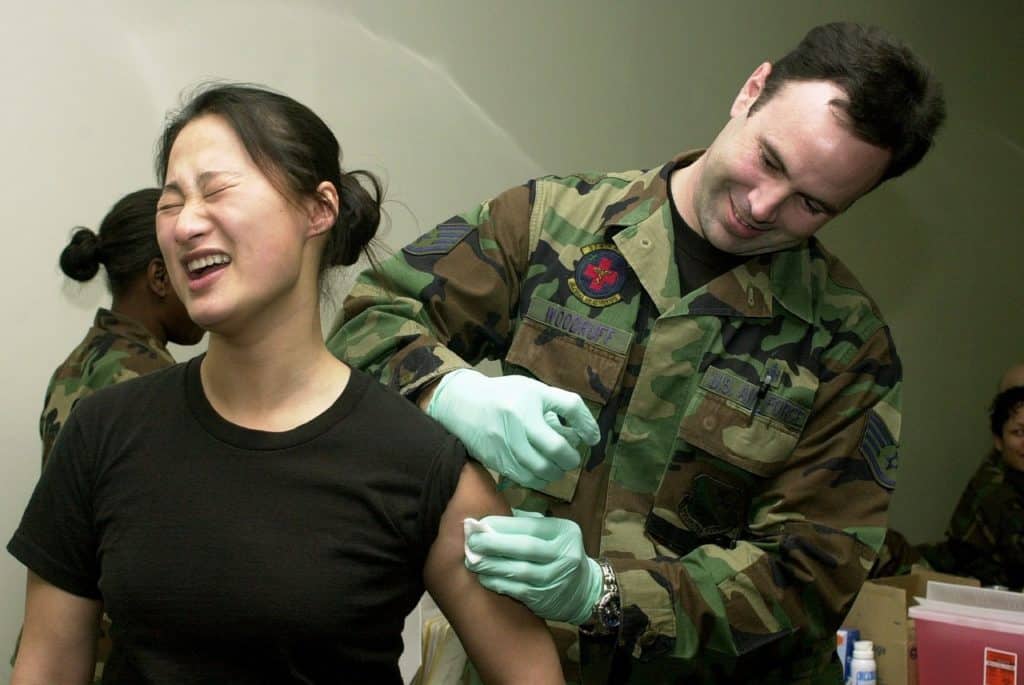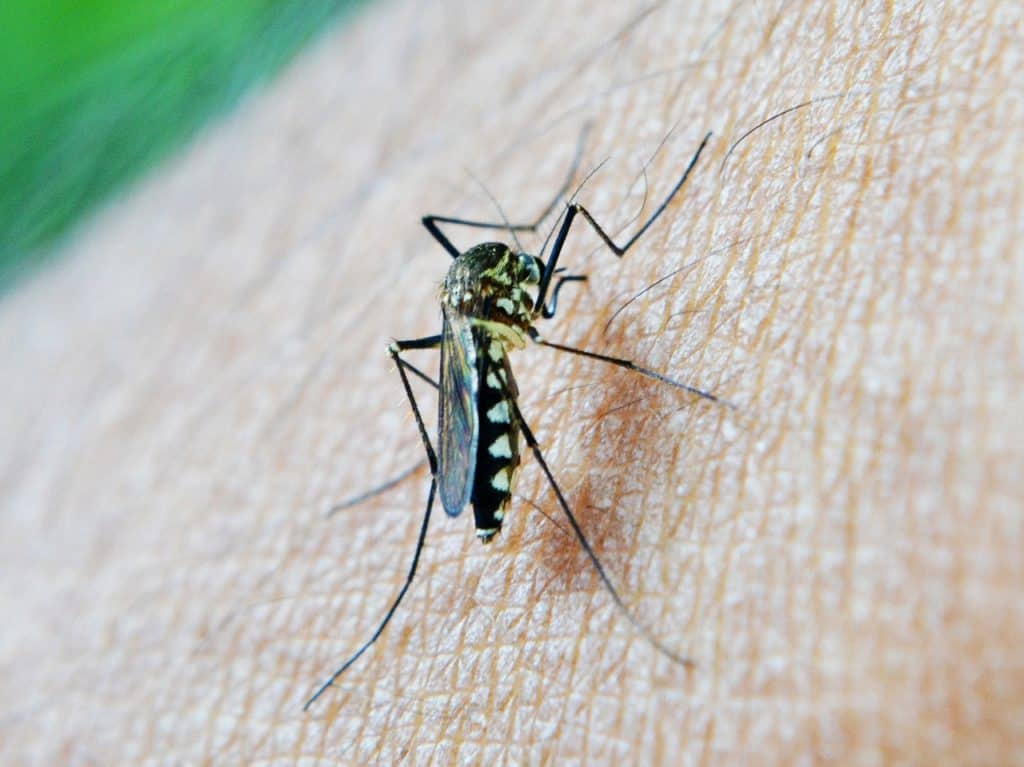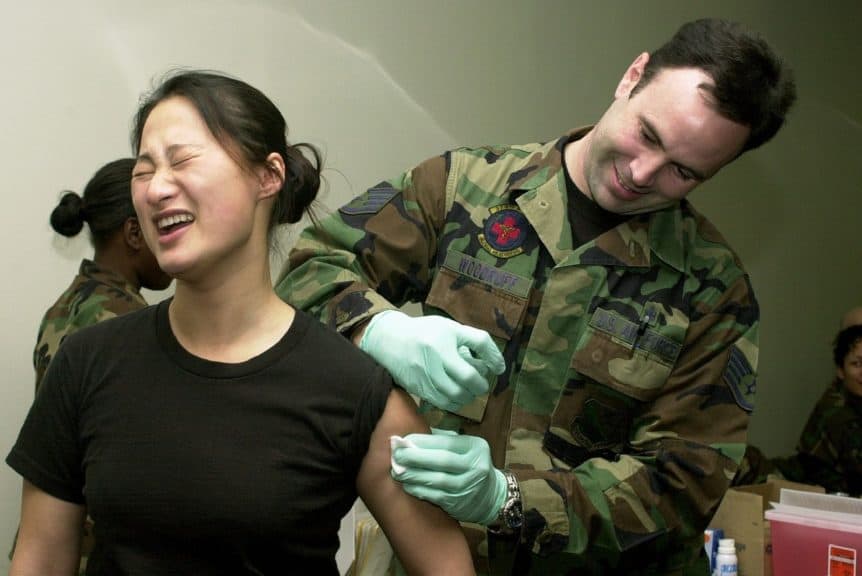
It is important to be prepared in advance of your trip to Costa Rica and get the proper vaccination before going on your trip to Costa Rica.
Costa Rica does not currently require any specific vaccinations for travelers from the USA, Canada or Europe. However, when traveling to Costa Rica, it is important to be up-to-date on routine vaccinations such as measles-mumps-rubella (MMR), diphtheria-tetanus-pertussis, and varicella.
Depending on your itinerary and personal health, other recommended vaccinations include hepatitis A and B, typhoid, and yellow fever (if traveling from a country with a risk of yellow fever transmission).
Additionally, the Costa Rican Ministry of Health recommends that all their citizens and residents be up to date on their routine vaccinations, including those for measles, rubella, and tetanus. You have to get your vaccinations at least ten days before you enter Costa Rica.
Now, lets take a closer look at each vaccination and why they are needed for Costa Rica.

Vaccinations For Costa Rica
Some vaccinations are recommended by the CDC that can protect you with different diseases and help you save not only your trip but yourself as well. So if you want to protect yourself as much as possible, these are some of the most important vaccinations that you should think about getting if you have not done so already.
All these vaccines are recommended by both CDC and WHO to all the travelers who are going to Costa Rica. You may want carry proof of all these to avoid any problems, but it is not mandatory and in all the years I have been going back and forth to Costa Rica, I have never been asked.
Covid 19 Vaccination
Let’s get this one out of the way first as it’s the one most commonly asked.
As of April 1, 2022, no covid vaccine is required! Costa Rica’s vaccine mandate and all other Covid related entry and travel restrictions for Costa Rica have been suspended.
That means you no longer need a proof of a negative covid test, no vaccination shots or the previously required health pass. In addition, you do not have to have travel insurance or QR codes.
Typhoid Vaccination
This is one of the most recommended vaccinations that every traveler should get before going to Costa Rica. This disease spreads through food and water and is more easily contracted if you are in the smaller cities or in more rural areas of Costa Rica.
If you are planning to travel to the rural areas, villages, small cities in Costa Rica, you are going to get exposed to the local food as well as water supplies on a high scale. In such cases, it is recommended to take the typhoid vaccines.
Some of the typhoid vaccines which can be administered into tourists, traveling to Costa Rica include Vi capsular polysaccharide vaccine, attenuated vaccine, and oral lives.
However, you need to know that the vaccinations for typhoid are not 100% effective. Both vaccines are capable of providing only 50-80% protection to the person gets this vaccination
Hepatitis A Vaccination
Hepatitis A is recognized to be an infection in the liver which might spread through the feces of a person, who has already been infected. There are increased risks of getting infected by Hepatitis A in specific areas of Costa Rica that have low hygiene and sanitation. This condition can be life-threatening and result in liver failure.
This vaccination is recommended for those people who work or have traveled to countries that have a higher or intermediate level of hepatitis A virus infection, where there are risks of exposure via water or food.
Hepatitis A might also be common in travelers from developing countries having typical tourist itineraries, food consumption behavior, and accommodation.
Though Hepatitis A is known to occur in people, in Costa Rica, the number is not significantly high. In such cases, it is essential to take monovalent vaccines for preventing the spread of this disease.
VAQTA which is manufactured by Merck & Co. Inc., and HAVRIX, which is manufactured by GlaxoSmithKline are recognized to be the only monovalent vaccines that can be administered for preventing hepatitis A.
These vaccines need to be administered in the muscles of the shoulder of the person two weeks BEFORE their travel to Costa Rica. It is a must to complete the vaccination series to be protected long term against this disease.
Apart from this vaccine, you need to watch your food habits while you are in Costa Rica. You also need to adhere to the required safety and protective measures after using the restroom such as washing your hands before leaving and befoe eating.
Hepatitis B Vaccination
Hepatitis B affects the liver and is spread through blood and body fluids.If you think you might be “overly friendly” with those you might meet, then get the vaccination.
In Costa Rica, every child is given the vaccination to ensure protection against these diseases after birth and once they are three and six months old. In case you have never taken the vaccination for Hepatitis B, and still intend to travel to Costa Rica, it is a must to get this vaccination.
Rabies Vaccination
Rabies spreads through saliva of infected animals, so it is recommended for all the travelers who are planning to go to more rural areas or will be near people’s pets.
If you are planning on doing some adventure tours in Costa Rica where you might be doing some trekking and you think you will be in clos
Costa Rice is filled with bats and other mammals that carry the virus that might cause rabies. However, there are rare instances when any of these animals might bite a person.
According to the Center for Disease Control and Prevention, it is recommended to get the vaccine for rabies only if you are planning to indulge in a wide array of outdoor activities in various rural areas, for instance, caving where there is an increased risk of getting bitten by either of these mammals.
In addition to this, people who need to work around or with animals, such as people researching wildlife, wildlife professionals, should get this vaccine.
If you are planning to travel to Costa Rica from either Sub-Saharan Africa, you need to show the certificate of vaccination of this disease at the airport while entering Costa Rica. You are not allowed to travel to this place within ten days of getting the vaccination.
Yellow Fever
You do not have any risks of having Yellow Fever if you have come from the USA. Hence, you do not need any vaccination in such cases. However, it is a must to get the vaccination if you are a resident of or have traveled recently to Nigeria, Liberia, Sierra Leona, Republic Democratic of Congo, Benin, Angola, Gambia, Burnika Faso, Liberia, Nigeria, to name a few. You need to take these vaccinations within 10 days before traveling to Costa Rica.
Malaria

Is Malaria Common in Costa Rica?
A lot of people have these questions about malaria pills. So in simple words, the risk of malaria and dengue depends on which areas you are visiting and what time of year you are planning to visit. Nothing is sure about malaria because the news and information about it are dynamic.
The information about malaria keeps changing every year. As of now, it is not necessary and not recommended by CDC to get a malaria vaccination before traveling to Costa Rica.
There is no need of taking any shots or immunizations before entering Costa Rica from Europe to North America.
However, if you are coming from South America or Sub- Saharan Africa or if you have recently traveled there, then you might already have a vaccination for yellow fever which should cover you for any potential issue in Costa Rica..
The malaria risk is less in most of the tourist destinations. Places like Arenal, Monteverde are less prone to malaria infections but if you are planning to go to remote coastal areas of Costa Rica, then you will to show extra care.
Keep in mind that in the early evening or early morning, the chances of getting bit by mosquitoes are high, so if you want to enjoy the sunset or sunrise, then make sure you are fully covered and also use mosquito repellent extra safety.
Dengue Fever and Costa Rica
Some discussion about malaria is mentioned above but there is another mosquito-borne disease that hit people of Costa Rica which is dengue. Dengue affects more people in Costa Rica in comparison to malaria and there have been reported cases recently of this mosquito-borne disease in Costa Rica.
There are more mosquito diseases like zika and chikungunya, but dengue cases are the highest among all. All these diseases affect more people in the rainy season.
If you are concerned bout Dengue while visiting Costa Rica, then try to visit in non-rainy months but if you have already made plans for the rainy season, then just make sure to do proper dengue vaccinations to avoid any infections.
Dengue symptoms are fever, rashes, joint and abdomen pain and severe dengue cause vomiting, high pain in joints, breathing problems.
Dengue is the most common mosquito-borne disease in Costa Rica and you should be very careful about it.
Other Vaccinations
There are also other vaccines like TDAP, chickenpox, MMR, Tetanus, Influenza, and others, but those you probably already have had at some point and you should just make sure they are up to date before traveling to Costa Rica.
Vaccinations and Prevention in Costa Rica

Everything related to diseases, infections, and vaccinations is mentioned above but now it’s time to talk about precautions that every traveler should take to have a healthy stay in Costa Rica.
If you have done all the things you need to regarding vaccines and medications, I am going to now mention things some things that you can do to help lessee chance of anything happening So down below is a list of things that you should take care of while you are in Costa Rica.
Eat and Drink Safely
Though most of the food and to a certain extent water quality in Costa Rica is similar to the USA, you still youst take care when choosing where and what to eat and drink. In the main areas and cities, you will get more then likely get good, quality food but if you are planning to visit to more rural areas of Costa Rica, then be extra careful on what you eat and drink.
Avoid drinking water from private wells and take precautions while consuming water fromsuch things as public faucets or more the water in more rural homes. You may want to bring a water purifier with you.
I found this one on Amazon that cost about $18
Plan Medical Care Properly
One important thing that everyone should do is to make a good list of all the medical facilities such as hospitals like CIMA and doctors of the places in Costa Rica where you are going. Also remember to take any medication that you need while traveling as it may be difficult to find it in Costa Rica.
Avoid Unfamiliar Animals
There are diseases like rabies that spreads through animals, so it is better to stay away from or at least try not to touch them. To avoid any health problems, don’t feed unknown animals and always clean your hands properly with a good hand sanitizer.
Clothing
You can lessen the chances of getting bit by mosquitos by covering where they can bite. This can be done by wearing long sleeve shirts, long pants, covered shoes and a hat.
Also make sure you cover any exposed areas such as hands and face with mosquito repellent. Get a repellent that contains at least 20% deet and that can last for at least several hours
Also at your hotel or Airbnb make sure you have the windows closed and th Air conditioning on, if possible, to avoid any unwanted “friends” from visiting while you sleep.
If you plan doing alot of camping than make sure you bring a bed tent so cover yourself at night and prevents any bugs from getting in.
Final Thoughts
I hope I was informative without making you overly paranoid. It is very important to get all the immunizations that you think are appropriate for where in Costa Rica are going and your style of travel, to keep yourself from infections.
More then a few people have gotten affected by malaria and dengue in Costa Rica, so if you don’t want to ruin your trip (and health) then should be as well prepared as possible.
Remember the quote from Ben Franklin which is as appropriate today as the day he wrote it:
“an ounce of prevention is worth a pound of cure”
as the these infections could not only not ruin your holiday butif left untreated then it can cause severe health problems.
In the end it will depend on you and your health. The only suggestion is before coming to Costa Rica, see a doctor about any vaccinations and their recommendations.

